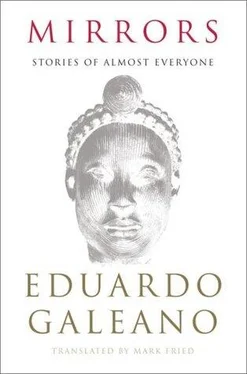From their indigenous ancestors they inherited silence.
They said nothing, or they said:
“Poor guy.”
Nothing else.
But later on in town squares, little by little tongues began to loosen:
“It wasn’t him.”
“It was someone else.”
“I thought he looked too fat.”
“The mole above his eye was missing.”
“He left on a ship, from Acapulco.”
“He slipped away at night, on a white horse.”
“He went to Arabia.”
“He’s over there, in Arabia.”
“Arabia’s really far away, farther than Oaxaca.”
“He’ll be back soon.”

He never wrote the most famous maxim people attribute to him, and who knows if he ever said it:
“The ends justify the means.”
In any case, he certainly did what he did because he knew what he wanted to achieve and he lived to achieve it. He spent his days and nights organizing, arguing, studying, writing, conspiring. He allowed himself time to breathe and eat. Never to sleep.
He had been living in Switzerland for ten years, on his second exile. He was austere, dressed in old clothes and ugly boots. He lived in a room over a shoe-repair shop, and the smell of sausages that wafted up from the butcher’s next door made him nauseous. He spent all day in the public library, and was more in touch with Hegel and Marx than with the workers and peasants of his own country and his own time.
In 1917, when he got on the train that returned him to St. Petersburg, the city later named for him, few Russians knew who he was. The party he founded, which would soon acquire absolute power, had little popular support and was more or less to the left of the moon.
But Lenin knew better than anyone what the Russian people needed most: peace and land. As soon as he got off the train and gave his first speech, a crowd sick and tired of war and humiliation saw in him their interpreter and their instrument.

To be natural and clean, like the water we drink, love must be free and mutual. But men demand obedience and deny pleasure. Without a new morality, without a radical shift in daily life, there will be no real emancipation. If the revolution is not to be a lie, it must abolish in law and in custom men’s right of property over women and the rigid social norms that are the enemies of diversity.
Give or take a word, this is what Alexandra Kollontai, the only woman in Lenin’s cabinet, demanded.
Thanks to her, homosexuality and abortion were no longer crimes, marriage was no longer a life sentence, women had the right to vote and to equal pay, and there were free child care centers, communal dining halls, and collective laundries.
Years later, when Stalin decapitated the revolution, Alexandra managed to save her neck. But she was no longer Alexandra.

He learned to write in the language of Georgia, his homeland, but in the seminary the monks made him speak Russian.
Years later in Moscow, his south Caucasus accent still gave him away.
So he decided to become more Russian than the Russians. Was not Napoleon, who hailed from Corsica, more French than the French? And was not Catherine the Great, who was German, more Russian than the Russians?
The Georgian, Iosif Dzhugashvili, chose a Russian name. He called himself Stalin, which means “steel.”
The man of steel expected his son to be made of steel too: from childhood, Stalin’s son Yakov was tempered in fire and ice and shaped by hammer blows.
It did not work. He was his mother’s child. At the age of nineteen, Yakov wanted no more of it, could bear no more.
He pulled the trigger.
The gunshot did not kill him.
He awoke in the hospital.
At the foot of the bed, his father commented:
“You can’t even get that right.”

It was said, is said: social revolutions under attack from the powerful within and from the imperialists without cannot afford the luxury of freedom.
Nevertheless, it was in the first years of the Russian Revolution, when it was beleaguered by enemy harassment, civil war, and foreign invasion, that its creative energy flowed most freely.
In better times later on, when the Communists controlled the entire country, the dictatorship of the bureaucracy imposed its sole truth and condemned diversity as unpardonable heresy.
Painters Marc Chagall and Wassily Kandinsky left and never returned.
Poet Vladimir Mayakovsky put a bullet through his heart.
Another poet, Sergei Yesenin, hanged himself.
Writer Isaac Babel was shot.
Vsevolod Meyerhold, who had made a revolution with his bare theatrical stages, was also shot.
Shot too were Nikolai Bukharin, Grigory Zinoviev, and Lev Kamenev, revolutionary leaders from the beginning, while Leon Trotsky, founder of the Red Army, was assassinated in exile.
Of the revolutionaries who began it all, not one remained. All were purged: buried, locked up, or driven out. And they were removed from official photographs and from history books.
The revolution elevated to the throne the most mediocre of its leaders.
For what you did or what you would do, as punishment or just in case, Stalin sacrificed those who cast a shadow on him, those who said no, those who did not say yes, those who were dangerous today, and those who would be dangerous tomorrow.
PHOTOGRAPH: ENEMIES OF THE PEOPLE

Bolshoi Theater Square, Moscow, May 1920.
Lenin addresses Soviet soldiers before they depart for the Ukrainian front to fight the Polish army.
At Lenin’s side on the dais above the crowd are Leon Trotsky, the other orator on the program, and Lev Kamenev.
The photograph by G. P. Goldshtein becomes a symbol of the Communist revolution around the globe.
A few years later, Trotsky and Kamenev would be gone from the photo and from the world.
A little retouching erased them and put five wooden steps in their place, while executioners did the rest.
THE INQUISITION IN STALIN’S TIME

Isaac Babel was an outlawed writer. He explained:
“It’s a new genre I’ve invented: silence.”
He was imprisoned in 1939.
The trial lasted twenty minutes.
He confessed to having written books in which his petit bourgeois outlook distorted revolutionary reality.
He confessed to having committed crimes against the Soviet state.
He confessed to having spoken with foreign spies.
He confessed to having contact with Trotskyites during his trips outside the country.
He confessed to knowing about a plot to assassinate Comrade Stalin and not going to the police.
He confessed to feeling attracted to the enemies of the fatherland.
He confessed that all his confessions were false.
They shot him that very night.
His wife learned of it fifteen years later.

She was born in Poland, lived in Germany. She dedicated her life to social revolution, right up to the day at the beginning of 1919 when the guardian angels of German capitalism broke her skull with their rifle butts.
Читать дальше



















